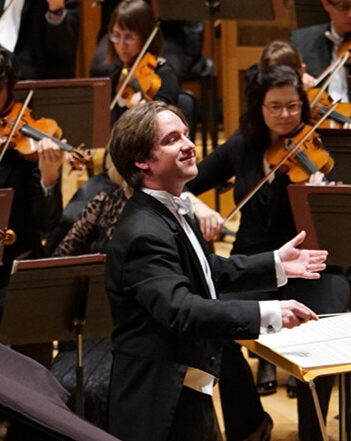
Joy!
Friday, September 13, 2024
Amy Owens, Soprano
QUINN MASON A Joyous Trilogy
MOZART Exsultate Jubilate
DVORAK Symphony No. 8
Maestro Conner Gray Covington’s season opener reflects his aesthetic of JOY through musical expression. Composer Quinn Mason (b. 1996) wrote A Joyous Trilogy in hopes of creating a piece that is the “very embodiment of happiness and cheerfulness, an accessible work that would put any listener in a good mood.”
Following this is Mozart’s exquisite Exsultate Jubilate (‘Exult, Rejoice!’), which the composer wrote at the ripe age of 23, featuring the stunning soprano voice of Amy Owens.
Closing out Covington’s program is Dvořák’s 8th Symphony which is known for celebrating the sheer joy of being alive in a world of natural wonders.
David Lipten Reviews Joy!
The Tallahassee Symphony Orchestra started its search for a new conductor with its Sept. 13 season opener under the baton of guest conductor Conner Gray Covington. Maestro Covington’s varied program included Mozart’s Exsultate, Jubilate, K. 165 (written in 1773), Antonin Dvorak’s Symphony No. 8, Op. 88 (from 1889), and Joyous Trilogy, a work that was written in 2019 and then revised in 2021, by Dallas-based composer Quinn Mason who was also present at the concert. All three works were meant to convey a feeling synonymous with the title of the concert, “Joy,” and it turned out to be a happy occasion, indeed.
The evening began with an introduction to the newest work by Mr. Mason himself. His presence and presentation created a bond between the music makers and the audience, paving a way for the acceptance and appreciation of a new, unfamiliar work. If the audience held any trepidations in hearing a new work, I’m sure they were immediately dispelled as the musical language Mr. Mason employed in a Joyous Trilogy was quite recognizable and sparkled throughout. This is a composer who clearly understands the orchestra and knows how to take advantage of its many varied colors. Maestro Covington did well by programming such a fun, easily digestible new piece, one that might serve as an entryway to other, more challenging and interesting works.
Next up was the Mozart motet, masterfully sung by guest soprano Amy Owens and beautifully accompanied by the orchestra. Originally scored for a much smaller group, Covington managed to convey its original intimacy, despite the presence of a large orchestra through obvious attention to detail and balance in all its forms. His fondness for opera was clear in the way the accompaniment supported Ms. Owens’ impressive vocal clarity and calisthenics without ever covering up her voice and in the way the music was polished.
Before intermission, Ms. Owens and company treated the audience to one of Donizetti’s bel canto arias. The musical partners were clearly having a great time. The large number of “ooo’s” and “aah’s” I heard indicated that the audience really enjoyed it, too.
The final piece on the program was the Dvorak Symphony. This, and most other, lengthy works can pose a challenge to conductors, orchestras, and audiences alike; that being how to maintain interest over an extended period. When I spoke with Covington, he agreed that this was a challenge, but that it was something that could be addressed through phrasing, knowing where to hold back and where to let loose, and understanding and conveying the arch of the work. He clearly mastered all these facets as the orchestra sounded incredible throughout. Covington was even beaming during the last movement (Allegro ma non troppo). He did much to transmit his joy to both the orchestra and, in turn, to everyone present. A good time was clearly had by all.
David Lipten
Hungry for more?
Have Lunch with the Maestro!
Join us at the Governors Club for an elegant lunch-and-learn with each conductor candidate. Meals are $30 each and may be added to your ticket order or purchased separately up to a week in advance of each event.
Be a part of the process;
Join the Conductor’s Circle!
Help shape the future of the TSO! As a member of the Conductor’s Circle, you will provide valuable feedback on the Conductor candidates and more fully participate in our search.
Q & A with Conner

Learn more about Conductor Conner Gray Covington
Described as “a musician who lives the music” by Yannick Nézet-Séguin, Conner Gray Covington is one of the most versatile conductors of his generation. Covington recently completed a four-year tenure with the Utah Symphony as Associate Conductor and Principal Conductor of the Deer Valley® Music Festival. During his tenure in Utah, he conducted nearly 300 performances of classical subscription, education, film, pops, and family concerts as well as tours throughout the state. In the 2023-2024 season, Covington debuts with the Tucson Symphony and returns to the North Carolina Symphony, Portland (ME) Symphony, and makes several appearances with the Utah Symphony including his return to their Masterworks series in a program of Haydn, Richard Strauss, Samuel Barber and a world premiere by Quinn Mason. With an increasing presence in the opera world, Covington makes his Utah Opera debut conducting a production of Mozart’s Le Nozze di Figaro and also collaborates on a production of Gounod’s Roméo et Juliette with Washington National Opera at The Kennedy Center. A four-time recipient of the Career Assistance Award from the Solti Foundation U.S., Covington was featured in the 2016 Bruno Walter National Conductor Preview.
Highlights of recent seasons include appearances with the symphonies of Kansas City, Nashville, Omaha, Rochester, San Diego, Sarasota, St. Louis, and Virginia as well as at the Bellingham Festival of Music, Grand Teton Music Festival, and New England Conservatory Opera. He has served as cover conductor for the Atlanta Symphony, Baltimore Symphony, Los Angeles Philharmonic, Philadelphia Orchestra, Pittsburgh Symphony, and the Florentine Opera Company. In 2014, Covington was selected by members of the Vienna Philharmonic to attend the Salzburg Festival as a recipient of the Ansbacher Fellowship for Young Conductors.
Covington studied conducting at the Curtis Institute of Music in Philadelphia where he worked closely with the Curtis Symphony Orchestra, with whom he made his Carnegie Hall debut in 2016, and the Curtis Opera Theater while being mentored by Yannick Nézet-Séguin. While at Curtis, he also performed in masterclasses of Marin Alsop, Stéphane Denève, Vladimir Jurowski, and Michael Tilson Thomas. He also studied with Neil Varon at the Eastman School of Music where he earned the Walter Hagen Conducting Prize. For two summers, Covington attended the Aspen Conducting Academy at the Aspen Music Festival and School where he worked closely with Robert Spano, Larry Rachleff, and Hugh Wolff. He also spent two summers as a student at the Pierre Monteux School for Conductors.
Born in Louisiana, Covington grew up in East Tennessee and began playing the violin at age 11. He completed high school at the renowned High School for the Performing and Visual Arts in Houston, Texas. He then went on to study violin with Dr. Martha Walvoord and conducting with Dr. Clifton Evans at the University of Texas at Arlington where he graduated summa cum laude with a degree in violin performance.
Conner currently lives in Boston with his wife Mischa and their two cats, Razel and Oreo and serves as a Visiting Faculty member at the Longy School of Music.

Learn more about Soprano Amy Owens
Amy Owens is known for her “high-flying vocals” and “scene-stealing” charisma on operatic and symphonic stages. Recently, she has performed with ensembles such as the National Symphony, Virginia Symphony, Buffalo Philharmonic, Virginia Opera, New Mexico Philharmonic, Utah Festival Opera, Chicago Opera Theater, Oberlin Contemporary Music Ensemble, Brooklyn Art Song Society, Utah Symphony, and Michigan Opera Theatre, among others. As a multi-disciplinary artist, Ms. Owens performed at the 50th annual New Orleans Jazz Festival with renowned musician Glen David Andrews in the Blues Tent. She released two collaborative albums: a debut album of original music, HAETHOR, which received acclaim in the electronica world as “an enchanted force,” and Songs of Leonard Bernstein.
